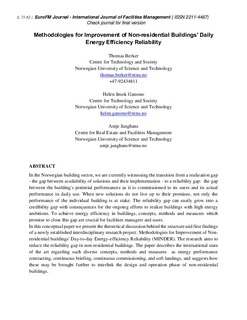Introducing the MINDER research project: Methodologies for Improvement of Non-residential buildings' Daily Energy Efficiency Reliability
Journal article
Submitted version
Permanent lenke
http://hdl.handle.net/11250/2462739Utgivelsesdato
2014Metadata
Vis full innførselSamlinger
Originalversjon
EuroFM Journal - International Journal of Facilities Management. 2014, 75-82.Sammendrag
In the Norwegian building sector, we are currently witnessing the transition from a realization gap - the gap between availability of solutions and their implementation - to a reliability gap: the gap between the building's potential performances as it is commissioned to its users and its actual performance in daily use. When new solutions do not live up to their promises, not only the performance of the individual building is at stake. The reliability gap can easily grow into a credibility gap with consequences for the ongoing efforts to realize buildings with high energy ambitions. To achieve energy efficiency in buildings, concepts, methods and measures which promise to close this gap are crucial for facilities managers and users. In this conceptual paper we present the theoretical discussion behind the structure and first findings of a newly established interdisciplinary research project: Methodologies for Improvement of Nonresidential buildings' Day-to-day Energy-efficiency Reliability (MINDER). The research aims to reduce the reliability gap in non-residential buildings. The paper describes the international state of the art regarding such diverse concepts, methods and measures as energy performance contracting, continuous briefing, continuous commissioning, and soft landings, and suggests how these may be brought further to interlink the design and operation phase of non-residential buildings.
